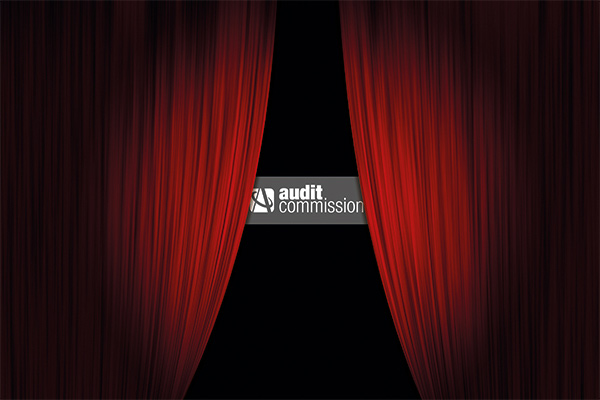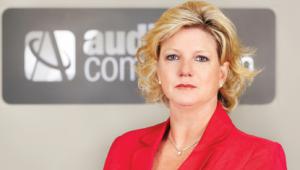By Marcine Waterman | 3 March 2014
As the Audit Commission prepares to leave the stage, its current controller reviews the public sector watchdog’s achievements over more than three decades – and the challenges to come before it takes a final bow

The Audit Commission officially opened its doors in 1983, seven years after the Layfield report first called for a body to ensure high quality local public audit, independent of both central government and audited bodies. Closing the commission will take slightly less time, as we cease operations at the end of March 2015, just under five years after the announcement by the government.
Everyone at the commission can recall their shock at the announcement in August 2010 that we would close. For us it was a John F Kennedy moment. There was worry and uncertainty. Now, with royal assent granted to the Local Audit and Accountability Bill on January 30, we have a clear way forward.
The commission will close 12 months from now, exactly 32 years after it started work. A transitional body will then oversee contracts with audit suppliers until they end in 2017, or 2020 if they are extended. When the contracts expire there will be a new framework for local public audit in the commission’s place.
I will be the final controller of audit, following in the footsteps of Sir John Banham, Sir Howard Davies, Sir Andrew Foster and Steve Bundred. This is the title set in legislation for the commission’s chief officer. Of the five chief officers, the role was called chief executive for only the fourth. In this way, as in many others, we are going back to our roots. With 20 years’ experience at the commission, I want to offer some personal reflections on the lifecycle of the organisation as it approaches its end.
Government and parliament decided that the Audit Commission is no longer needed, as they have every right to do. My personal and professional view is that the role it filled was important and that we did it well. I am unashamedly proud of the commission’s achievements.
Through regulation, oversight of auditor performance and technical support we helped local authorities to improve financial management and value for money beyond all recognition. By 2008, our ‘use of resources’ assessment found that no council had the lowest score for value for money, and almost 90% of councils had one of the top two scores for financial management
We have supported auditors to work independently and impartially, making decisions without fear or favour. During the Westminster ‘homes for votes’ affair, the commission indemnified the auditor and his legal team, which was instrumental in helping the case to reach a successful conclusion.
We have also adapted over time to meet the needs of local authorities, health bodies, the police, fire services, social housing providers and others to help them manage their money better and improve their performance. Changes in the law gave us new responsibilities – for example, appointing auditors to local health bodies.
Through performance assessments, inspections and value-for-money audits, we helped councils to improve their performance and innovate, providing a combination of challenge, independent quality control, quality assurance and improvement drivers.
Our national studies sought to provide a sound evidence base to support local decision-making. They identified billions of pounds of potential savings. Sustaining value for money in police services found that around £1bn in savings were possible without cutting public services. Valuable lessons found that schools could save £400m a year through better procurement.
This is far from a complete list. Like all staff, I will leave the commission with proud memories of working on interesting and worthwhile projects. My personal favourites include creating audit programmes assessing the accuracy of NHS waiting time data and police data – a hot topic today. I also helped to develop the methodology for verifying fire service modernisation, and produced two national reports as part of the resolution of the industrial dispute in 2003.
Whatever the project, I always saw in my colleagues the rigour and objectivity that are the hallmark of the commission and its staff.
Closing a public body involves as much change as opening one. As the organisation shrinks we’ve been able to de-layer, becoming less formal and less bureaucratic in culture, and recapturing the energy and dynamism of the commission’s earliest days. Our first controller of audit, Sir John Banham, came to the organisation from consulting and was noted for creating a culture very different from a government department. I come from a similar background, and my instinct is to have a similar management style.
I find myself managing a much smaller organisation than my predecessors, so have restructured to focus narrowly on our core functions. We have shrunk from some 2,000 staff in 2010 to fewer than 70 today. We have driven through efficiency measures to cut our costs and have worked to share or outsource back-office functions. Twenty-five regional offices have closed and our trimmer organisation now shares office space with several other public bodies.
Until the closedown, we have a full and challenging work programme. Most of our activities can be recognised from the Layfield report:
• Ensure the delivery of independent local public audit and report publicly on audit firms’ compliance with our regulatory requirements
• Publish national reports – such as Protecting the public purse and Auditing the accounts – on issues that matter to local public bodies.
• Maintain our online Value for Money Profiles tool, which consolidates data about the cost, performance and activity of councils and fire authorities, attracting 24,000 hits from unique visitors in the last year
• Deliver, based on data in the profiles, value-for-money briefings to show how council spending on activities such as council tax and business rates collection differs between organisations and over time
Providing information and assurance to taxpayers about public money is the ultimate goal of everything we whether it’s through our reports, our public information on audit quality or by setting technical guidance.
The main statutory activity that does not date back to the beginning of the Audit Commission (although it developed directly out of audit work) is our National Fraud Initiative. This has helped identify more than £1bn potentially lost to fraud, overpayment or error across the UK since 1996.
While we still manage the local public audit market in England, now valued at £85m, the way we do so has changed dramatically. One ambition of the commission’s founder, Lord Heseltine, was for local audit to be carried out largely or wholly by private firms. Soon after the creation of the commission, the firms’ share of the local audit market doubled to almost 30%, but it stayed at about that level for almost 30 years.
One of my earliest roles was on the audit bid team during market-testing exercises by the commission from 1994 to 1997. These led to private firms’ share of the market increasing slightly – but their bigger impact was in driving up the quality and customer focus of the work carried out by the commission’s in-house practice. Having come to the organisation from consulting, this was a shift I very much welcomed. I was also involved in the large-scale procurement exercises of 2006 and 2007, which let contracts for 30% of England’s local audit work.
We had all these experiences to draw on when we started work to outsource the remaining 70% of audit work carried out by our in-house practice in 2010.
By October 2012 we had successfully completed the work, achieving Lord Heseltine’s vision at least temporarily. Contract prices achieved from the procurement, coupled with internal efficiency savings, have allowed us to reduce the audit and certification fees charged to audit bodies by 40% from 2012/13. Over five years, this will save local public bodies some £250m and any remaining reserves will be returned to audited bodies prior to our closure.
Before we reach that stage, we’re using our bulk purchasing power again. We are retendering the 30% of audit contracts awarded in 2006 and 2007. If the last retendering process is anything to go by, and if the 2012 contracts are extended to 2020, this could deliver savings to local public bodies of more than £400m.
We plan to publish our 2014/15 work programme and scales of fees for local government and police audited bodies in March 2014. It is my aim that we continue to keep the fees frozen, as they have been since 2012/13, to deliver annual real-terms cuts for local authorities.
Since August 2010, my colleagues and I have been working with the Department for Communities and Local Government and others, to help make the new arrangements work. I am determined that the Audit Commission’s closure will be managed properly.
Audit contracts will transfer to the transitional body, together with the team who manage the contracts. They will continue to undertake the statutory functions in relation to audit; including compliance with contract requirements, appointing auditors, setting and determining fees, and making arrangements for housing benefit subsidy certification.
The National Audit Office will take on the statutory responsibility to produce and maintain the Code of Audit Practice and issue guidance to auditors while the National Fraud Initiative will transfer to the Cabinet Office on 1 April 2015.
We are still in discussion about the ultimate destinations for VFM Profiles and other tools, the researchers in our information and analysis team, and the counter-fraud team. Importantly, before the doors close, we will prepare and sign the commission’s 2014/15 accounts and annual report.
As we prepare to close, we have returned to our core functions – ‘in our end is our beginning’ (to paraphrase TS Eliot, like me another US citizen who settled in the UK). The achievements I’ve mentioned were only possible because of the professionalism and commitment of our staff. Since the closure was announced, I have had to say goodbye to many valued colleagues. It is a testament to the skills and experience they gained while working at an outstanding organisation, that so many have found such exemplary positions after they leave.
To draw on Eliot again, ‘to make an end is to make a beginning. The end is where we start from.’
Marcine Waterman is the Audit Commission’s final controller of audit
This feature was first published in the March edition of Public Finance magazine



















